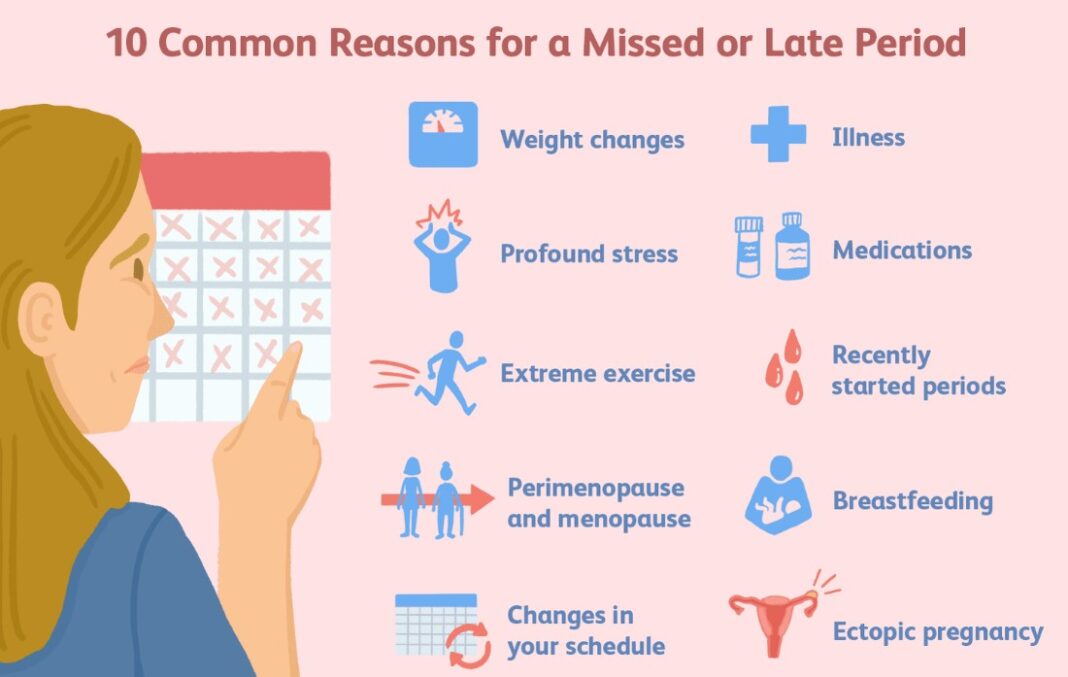BOURSESSENEGAL – Finding yourself asking, “Why is my period late?” can be both confusing and concerning. Your menstrual cycle plays a crucial role in your overall health, and any changes can lead to a flurry of questions. Whether you’re trying to conceive, dealing with stress, or simply noticing a shift in your routine, understanding the reasons behind a late period can empower you to take the next steps. In this article, we will explore the common causes of a late period, when to see a doctor, and tips for managing your menstrual health.
Understanding Your Menstrual Cycle
The Basics of Your Cycle
To understand why your period might be late, it’s essential to grasp how your menstrual cycle works. Typically, a menstrual cycle lasts between 21 to 35 days, with most women experiencing a cycle of about 28 days. Hormones regulate this cycle, and any fluctuations can lead to a missed period. Factors like age, health, and lifestyle play a significant role in the regularity of your cycle.
Hormones and Their Impact
Hormones, particularly estrogen and progesterone, control your menstrual cycle. An imbalance in these hormones can disrupt your cycle. For instance, stress or changes in body weight can cause hormonal fluctuations, leading to a late period.
Common Reasons for a Late Period
Stress and Mental Health
One of the most common reasons for a delayed period is stress. When you’re under pressure—whether from work, relationships, or life changes—your body may react by altering hormone levels. This can throw your cycle out of sync.
- Coping Mechanisms: Engaging in mindfulness, exercise, or talking to someone can help alleviate stress. Consider trying yoga or meditation to regain balance.
Weight Changes: Gaining or Losing
Significant weight changes can impact your menstrual cycle. Both weight gain and weight loss can lead to hormonal imbalances. For instance, athletes or individuals following strict diets might experience irregular periods due to low body fat or insufficient caloric intake.
- Healthy Weight Management: Aim for gradual changes in weight through balanced eating and regular exercise. Consult a healthcare provider for personalized advice.
Illness and Medical Conditions
Certain medical conditions can cause irregular periods. Polycystic ovary syndrome (PCOS), thyroid disorders, and uterine fibroids are just a few examples. These conditions can disrupt hormone production, leading to missed or delayed periods.
- When to Seek Help: If you suspect an underlying condition, consult a healthcare professional. They can provide appropriate tests and treatments tailored to your needs.
Medications and Birth Control
Hormonal birth control can significantly impact your menstrual cycle. Some women may experience lighter periods or missed cycles altogether. If you recently started or stopped taking birth control, this change could explain your late period.
- Consult Your Doctor: If you notice significant changes in your cycle after starting or stopping birth control, reach out to your healthcare provider for guidance.
Lifestyle Factors Affecting Your Period
Diet and Nutrition
What you eat can directly influence your menstrual cycle. A diet lacking in essential nutrients can lead to irregular periods. Conversely, a balanced diet rich in fruits, vegetables, and whole grains supports hormonal balance.
- Nutrition Tips: Incorporate a variety of foods into your diet. Focus on lean proteins, healthy fats, and complex carbohydrates to nourish your body and regulate your cycle.
Exercise: Too Much or Too Little?
While regular exercise is vital for overall health, excessive physical activity can lead to missed periods. On the flip side, a sedentary lifestyle can also disrupt your cycle. Finding a balance is crucial.
- Moderate Exercise: Aim for a mix of aerobic and strength-training exercises, and listen to your body. Adjust your routine based on how you feel.
Sleep Patterns and Rest
Quality sleep is essential for maintaining hormonal balance. Poor sleep can lead to increased stress levels, which can then impact your menstrual cycle. Ensure you prioritize rest and establish a consistent sleep schedule.
- Sleep Hygiene Tips: Create a calming bedtime routine, limit screen time before bed, and maintain a comfortable sleeping environment to improve your sleep quality.
When to See a Doctor
Signs of a Potential Issue
If you find yourself wondering, “Why is my period late?” and it’s accompanied by other symptoms, it might be time to consult a doctor. Signs to watch for include:
- Severe cramping or pain
- Unexplained weight changes
- Unusual discharge or bleeding
- Symptoms of pregnancy, such as nausea or breast tenderness
Getting the Right Diagnosis
When you visit your healthcare provider, be prepared to discuss your menstrual history, lifestyle, and any changes you’ve noticed. This information will help them determine the most appropriate tests or treatments. They may recommend blood tests to check hormone levels or ultrasounds to examine your reproductive organs.
Tips for Managing Menstrual Health
Track Your Cycle
Keeping a menstrual diary can help you identify patterns in your cycle. Note when your period starts and ends, any symptoms you experience, and factors that might influence your cycle, such as stress or diet changes.
Use Technology to Your Advantage
Consider using period-tracking apps. These tools can help you monitor your cycle and alert you to irregularities. Many apps also provide insights into your reproductive health.
Stay Informed and Educated
Knowledge is power. Educate yourself about your body and menstrual health. The more you understand, the better equipped you’ll be to manage changes and seek help when necessary.
Conclusion: Taking Control of Your Menstrual Health
If you ever find yourself asking, “Why is my period late?” remember that various factors can influence your menstrual cycle. Stress, weight changes, medical conditions, and lifestyle choices all play significant roles. Understanding these factors empowers you to take proactive steps toward managing your menstrual health.
If irregularities persist, don’t hesitate to consult a healthcare professional. With the right information and support, you can navigate your menstrual health confidently. Prioritize self-care, stay informed, and remember that your body is unique. Embrace the journey of understanding it better, and take charge of your well-being!
REFERENCE : depo99



